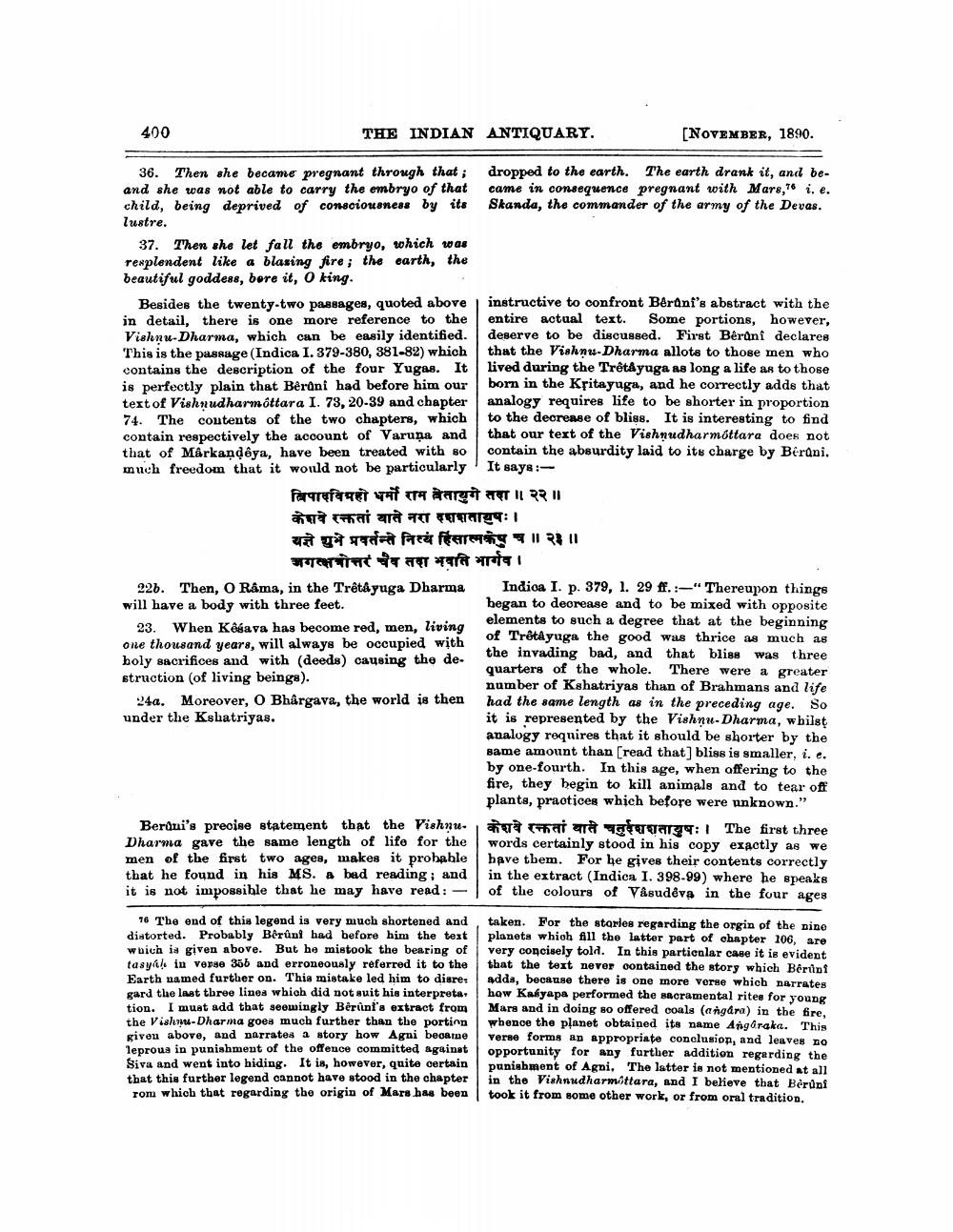________________
400
THE INDIAN ANTIQUARY.
[NOVEMBER, 1890.
36. Then she became pregnant through that; dropped to the earth. The earth drank it, and beand she was not able to carry the embryo of that came in consequence pregnant with Mars,76 i. e. child, being deprived of consciousness by its Skanda, the commander of the army of the Devas. lustre.
37. Then she let fall the embryo, which was resplendent like a blasing fire; the earth, the beautiful goddess, bore it, Oking.
Besides the twenty-two passages, quoted above instructive to confront Bérant's abstract with the in detail, there is one more reference to the entire actual text. Some portions, however, Vishnu Dharma, which can be easily identified. deserve to be discussed. First Berani declares This is the passage (Indica I. 379-380, 381-82) which that the Vishna-Dharma allots to those men who contains the description of the four Yugas. It lived during the Trêtåyuga as long a life as to those is perfectly plain that Bêrûni had before him our born in the Kpitayuga, and he correctly adds that text of Vishnudharmóttara I. 73, 20-39 and chapter analogy requires life to be shorter in proportion 74. The coutents of the two chapters, which to the decrease of bliss. It is interesting to find contain respectively the account of Varuna and that our text of the Vishnudharmóttara does not that of Markandêya, have been treated with so contain the absurdity laid to its charge by Berdni. much freedom that it would not be particularly It says:
विपादविग्रहो धर्मों राम वेतायुगे तदा ॥ २२॥ केशवे रक्ततां बाते नरा दशशतायुषः। यज्ञे शुभे प्रवर्तन्ते नित्यं हिंसात्मकेषु च ॥ २३ ।।
भगक्षत्रोत्तरं चैव तदा भवति भार्गव । 226. Then, O Råma, in the Trêtayuga Dharma Indioa I. p. 379, 1. 29 ff.:-" Thereupon things will have a body with three feet.
began to deorease and to be mixed with opposite 23. When Kesava has become red, men, living
elements to such a degree that at the beginning
of Trêtayuga the good was thrice as much as one thousand years, will always be occupied with
the invading bad, and that bliss was three boly sacrifices and with (deeds) causing the de.
quarters of the whole. There were a greater struction (of living beings).
number of Kshatriyas than of Brahmans and life 24a. Moreover, O Bhargava, the world is then had the same length as in the preceding age. So under the Kshatriyas.
it is represented by the Vishnu-Dharma, whilst analogy requires that it should be shorter by the same amount than [read that] bliss is smaller, i.e. by one-fourth. In this age, when offering to the fire, they begin to kill animals and to tear off
planta, practices which before were unknown." Berani's precise statement that the Vishnu. v a
yar : The first three Dharma gave the same length of life for the words certainly stood in his copy exactly as we men of the first two ages, makes it probable have tbem. For he gives their contents correctly that he found in his MS. a bad reading; and in the extract (Indica I. 398-99) where he speaks it is not impossible that he may have read :-of the colours of Vasudeva in the four ages
76 The end of this legend is very much shortened and distorted. Probably Beruni had before him the text woich is given above. But he mistook the bearing of tasyal in verse 35b and erroneously referred it to the Earth named further on. This mistake led him to diare. gard the last three lines which did not suit his interpreta. tion. I must add that seemingly Bêrunt's extract from the Vishn-Dharma goes much further than the portinn given above, and narrates a story how Agni became leproua in punishment of the offence committed against Siva and went into hiding. It is, however, quite certain that this further legend cannot have stood in the chapter rom which that regarding the origin of Mars has been
taken. For the stories regarding the orgin of the nine planeta whioh fill the latter part of chapter 106, are very concisely told. In this particular case it is evident that the text never contained the story which Berani adds, because there is one more verse which parrates how Kasyapa performed the sacramental rites for young Mars and in doing so offered coals (angara) in the fire whence the planet obtained its name Angoraka. This Verse forms an appropriate conclusion, and leaves no opportunity for any further addition regarding the punishment of Agni, The latter is not mentioned at all in the Vishnudharmóttara, and I believe that Beruni took it from some other work, or from oral tradition.




